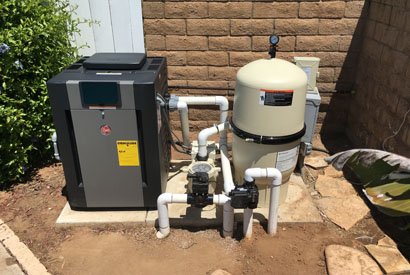What’s the most vulnerable piece on your equipment pad?
Are you have problems with your swimming pool heater? You’re not alone. Most pool owners deal with pool heater issues at some point or another. You should read this blog post before taking any drastic measures.
Relatively Quick Fixes
Odds are more than likely that a simple problem is causing issues with your swimming pool heater. You can determine the issue by following these steps.
- Check for Power Supply Issues
- Check for Error Codes
- Check the Temperature Settings
- Check the Pool Filter
Check for Power Supply Issues
Sometimes the simplest issues are the ones we overlook the most. You need to make sure your pool heater is receiving the power it needs. Is it plugged in? Are there any damaged wires? Did a breaker switch flip? Check for these relatively simple fixes before doing anything else.
Check for Error Codes
If it seems as though your pool heater is receiving adequate power, then you should check the system for error codes. Consult your owner’s manual or the internet to determine what each error code means. Generally, error codes that read “Lo/Hi” or “Flo” indicate that your pool heater is not receiving a sufficient amount of water. The most common issue is an ignition failure, which can be caused by a mechanical failure or a problem with gas flow.
Check the Temperature Settings
Don’t see any error codes? Your water heater’s temperature may not be set high enough. Your water heater’s temperature should always be set higher than the temperature of the water in your pool. Otherwise, what’s the point of the water heater?
Check the Pool Filter
Pool heaters require a steady flow of water to work properly, and a clogged or dirty filter could inhibit this steady flow. Make sure to check your water filter on a consistent basis and replace it if need be.
Water Chemistry Issues
If none of the aforementioned issues seems to be the problem, you may have issues with your water chemistry. High pH levels (hard water) create mineral buildup inside the heat exchanger, which restricts water flow, and increased water acidity levels cause deterioration and perforation of copper heat exchanger tubes.
Due to today’s use of modern pumps and larger PVC pipes, water flow rates can overpower the system’s design, and using the heater in cold weather (ambient air temperatures below freezing) can also have a negative impact.
Not having a chemical check valve on the return line between the heater and sanitizing device (e.g., in-line chlorine feeder or salt cell) can lead to chlorine gases migrating back through the return line when the equipment is off. These chlorine gases are highly corrosive and can permanently damage a heater and render it inoperable in as little as 30 days after the initial use.
Compounding the issue is that heating water naturally increases water hardness, so operating a heater on a routine basis with a pool that has a high pH will lead to hard water buildup in the heat exchanger and thus stop the water flow. If you use the heater frequently between water testing (even if you maintain the pH), it will cause the heater to experience periods of high pH effects.
If the service company that manages your pool’s water chemistry is not aware of the frequent heater use between their weekly visits, they can’t accurately maintain the proper chemistry for adequate pool operation. This means that the manufacturer will likely view the mineral buildup as a chemistry management deficiency and deny the unit warranty coverage.
Keeping Your Pool Happy and Healthy
Consider using enhanced pool technologies, such as the PoolSmart™ Skimmer, to continuously monitor your pool chemistry, including water level, temperature, and pH. This will help prevent future issues with your pool heater.
Owning an in-ground swimming pool can be a ton of fun, but unfortunately, it is also very expensive and requires a lot of upkeep and maintenance. The PoolStar Command app can help you stay ahead of the curve and keep your pool in tip-top shape.
Download the PoolStar Command app to gain access to loads of pool-related resources, tips, tricks, and guides and compare the value of your home to other homes with pools. PoolStar Command is a valuable resource that all pool owners should have at their disposal!

